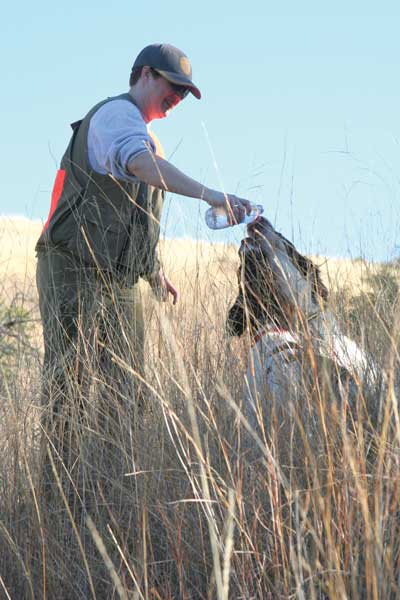 Heat-related problems manifest themselves in various forms, heat stroke and heat stress among them, but they're all harmful to your dog. Fortunately, they can almost always be prevented with proper planning and some common sense.
Heat-related problems manifest themselves in various forms, heat stroke and heat stress among them, but they're all harmful to your dog. Fortunately, they can almost always be prevented with proper planning and some common sense.
First, understand it doesn't have to be hot for a dog to develop a heat-related problem. A hard-running hunting dog, especially one that's overweight, can develop serious problems in temperatures in the 50s or 60s. So the very first preventative, and one that will help your dog in every other area of his life, is to make sure he's in good physical condition.
That means helping him lose excess weight and keeping him in shape. On a fit dog, regardless of breed, you should be able to just feel his ribs under his coat, and his belly should tuck upward, not be level with his chest.
Always — no exceptions — carry extra water when you're running a dog in hot weather. Never rely on finding natural sources of water; natural sources have a way of disappearing when you need them most. Keep extra water in your hunting vest and at least a couple additional gallons of water in your truck.
 Dog crates, particularly plastic airline crates, can get dangerously hot when placed in the back of a closed pickup. Wire mesh crates provide much better air flow and are significantly cooler.
Dog crates, particularly plastic airline crates, can get dangerously hot when placed in the back of a closed pickup. Wire mesh crates provide much better air flow and are significantly cooler.
Also extremely helpful, regardless of what type of crate you use, are portable fans that clip on the door of the crate. Turned on high, they do a very effective job of cooling down the dogs within.
If your dog should exhibit any signs of heat stress on a hunt, stop and cool him off immediately. Those signs include excessive panting, glassy eyes, staggering and drooling. Make him rest, give him water, and if there's a pond or creek nearby, bathe him with water to cool him off. If he still seems to be in distress, play it safe and take him to a vet immediately.
Finally, use some common sense. If it's hot, limit your dog's time in the field. Don't hunt a dog for four or five hours if it's 70 degrees; doing so is asking for trouble. On warmer days, keep your hunts to two hours or less and hunt early in the morning, when it's cool.
He'll be much happier and you'll both be ready to go again the next day.






